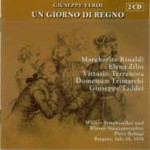Verdi’s second opera, a comedy, was a dismal failure at its premiere, so much so that the composer later said that he considered giving up composing operas altogether. Of course he did not, but it took him another 53 years to try his hand at humor in music. Un giorno di regno gets a bad rap; it’s really delightful, with abundant if not very sophisticated melodies, nice duets, at least three good arias, and an ensemble or two that the bel canto composers who came before Verdi would have been proud to pen. It is old fashioned–Verdi even uses secco recitative (the only time he did)–and it is made up of set numbers, à la Donizetti.
The libretto is run-of-the-mill (Belfiore, disguised as the King, visits Baron Kelbar’s castle and helps Baron’s daughter Giulietta in her amorous dealings with her beloved Edoardo by getting rid of the Treasurer who loves her; meanwhile Belfiore is re-united with the Marchesa, who thought he had dumped her) but Verdi’s music has forward propulsion and charm, and while the orchestration is not brilliant, the vocal lines can be remarkable.
This performance, from 1974 in Bregenz, is a delight and easily can be seen as a cheaper alternative to its star-studded competition (Cossotto, Norman, Carreras, Wixell, Gardelli) on Philips (I’ve not heard a 1951 broadcast from RAI with Bruscantini, Pagliughi, and Oncina). The sound is a bit bright and there are a few cuts, but this performance, recorded live, has great energy and give-and-take (the Gardelli, mostly beautifully sung, sounds as if the cast had learned their parts for the recording), and the singing overall is splendid.
Margherita Rinaldi sings the Marchesa vivaciously, with ease in coloratura and top notes; Domenico Trimarchi and Enrico Fissore, as Belfiore and the Treasurer, are terrific individually and in their buffo duet; Giuseppe Taddei is a wonderful Kelbar, and Elena Zilio’s Giulietta has much more spunk than the rather earth-bound Jessye Norman on Philips. Vittorio Terranova was a good leggiero tenor of this period, and while his Edoardo is fine, the young José Carreras is a knockout. Piero Bellugi’s leadership is even livelier than Gardelli’s.
Gala includes excerpts from the first two acts of a performance of Macbeth from Philadelphia in 1983 under Riccardo Muti. Aside from Renato Bruson’s knowing Macbeth and some exciting ensemble work, it’s not a great performance–Elizabeth Connell sings with passion as Lady M but she also misses many crucial notes. This set is recommended for the Giorno; the Macbeth is just there if you want it.
































